Supporting Community Start-ups During COVID-19

Evelyn Sachiti from the Women Advocacy Project in Zimbabwe delivers emergency supplies in Harare and stresses the importance of wearing face-masks
The Advocacy Project responded to the COVID-19 pandemic in 2020 by investing $25,659 in eight local initiatives in Mali, Zimbabwe, Uganda, Kenya, Nepal and Palestine. These are described below. All were run by local leaders who were well known to us from past work or through our partners. In launching these start-ups, our first aim was to address the economic emergency and ease some of the financial pressure on partners who were vulnerable even before the pandemic. We also favored start-ups that offered an innovative response to the crisis and could be sustained after the pandemic receded and even evolve into small businesses.
The projects are described below as they evolved in 2020. The funds came partly from our core program and partly from 183 individual donations, mainly through GlobalGiving. Visit our 2020 Annual Report for more details. Based on feedback from partners, we estimate that approximately 8,000 individuals benefited from these projects. Thousands more were served by the clinics and NGOs that have received masks, soap and food through these projects.
Mama Masks in Gulu, Uganda
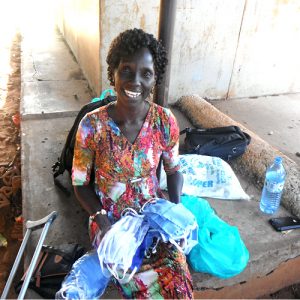 Working with a donation of $1,100 from AP, Mama Cave (photo) 36 – a single mother and tailor with limited mobility – has trained four other women to produce Mama Masks. They have since made 1,100 masks. 200 masks have been given to persons with disability, and 800 sold to NGOS (Caritas and Hive Uganda) for $460. Each mask-maker receives 150,000 shillings ($40) a month, and all profit is reinvested in the project. AP raised $1,967 on GlobalGiving to expand production to 2,500 masks by end 2020. Beneficiaries: 1,100 individuals plus 5-person team (25 family members). Managed by the Gulu Disabled Persons Union. Working with a donation of $1,100 from AP, Mama Cave (photo) 36 – a single mother and tailor with limited mobility – has trained four other women to produce Mama Masks. They have since made 1,100 masks. 200 masks have been given to persons with disability, and 800 sold to NGOS (Caritas and Hive Uganda) for $460. Each mask-maker receives 150,000 shillings ($40) a month, and all profit is reinvested in the project. AP raised $1,967 on GlobalGiving to expand production to 2,500 masks by end 2020. Beneficiaries: 1,100 individuals plus 5-person team (25 family members). Managed by the Gulu Disabled Persons Union.
|
Clean Wash soap in Gulu, Uganda
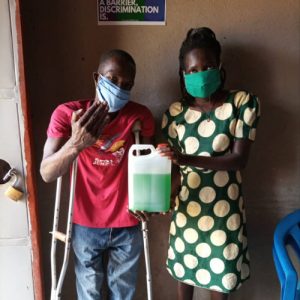 Working with $500 from AP, the Gulu Disabled Persons Union (GDPU) has recruited 5 of its members to produce soap, under the leadership of Freeman Olyel Sunday (photo) a professional soap-maker with limited mobility. The team has called their soap Clean Wash and their label has been designed by AP assistant Grace McGuire. Freeman’s team produced over 500 liters in the first week and secured orders for 400 liters. (The first 20 liters were purchased by Betty Aol Achan, leader of the parliamentary opposition in Uganda.) AP recently raised $1,735 for Clean Wash soap on Global Giving to grow the business this year. Each soap-maker receives 150,000 shillings ($40) a month, and all sales are reinvested in the project. Beneficiaries: 5-person team (25 family members). Managed by the Gulu Disabled Persons Union. Working with $500 from AP, the Gulu Disabled Persons Union (GDPU) has recruited 5 of its members to produce soap, under the leadership of Freeman Olyel Sunday (photo) a professional soap-maker with limited mobility. The team has called their soap Clean Wash and their label has been designed by AP assistant Grace McGuire. Freeman’s team produced over 500 liters in the first week and secured orders for 400 liters. (The first 20 liters were purchased by Betty Aol Achan, leader of the parliamentary opposition in Uganda.) AP recently raised $1,735 for Clean Wash soap on Global Giving to grow the business this year. Each soap-maker receives 150,000 shillings ($40) a month, and all sales are reinvested in the project. Beneficiaries: 5-person team (25 family members). Managed by the Gulu Disabled Persons Union.
|
Face masks in Mali
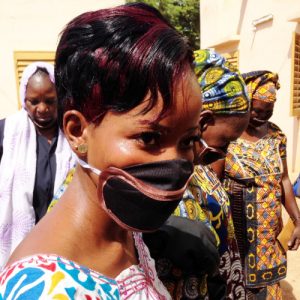 AP transferred has transferred $600 to Abi Konate, an experienced tailor who worked with AP between 2014 and 2018 on a program for GBV survivors funded by the German government. Abi formed a team of 5 young tailors, most of them displaced from the war in the north. Together they have made 700 masks, of which 200 were given away free. The remaining 500 were sold to NGOs and the Keneya clinic for $248. Abi has requested another $300 from AP to buy sewing machines for her workers. Beneficiaries: 700 + 5-person team (25 family members). Managed by Abi Konate. AP transferred has transferred $600 to Abi Konate, an experienced tailor who worked with AP between 2014 and 2018 on a program for GBV survivors funded by the German government. Abi formed a team of 5 young tailors, most of them displaced from the war in the north. Together they have made 700 masks, of which 200 were given away free. The remaining 500 were sold to NGOs and the Keneya clinic for $248. Abi has requested another $300 from AP to buy sewing machines for her workers. Beneficiaries: 700 + 5-person team (25 family members). Managed by Abi Konate.
|
Soap in Mali
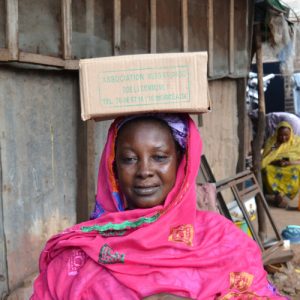 AP has made two transfers totaling $600 to Aissata Toure, a professional soap-maker and leading member of the Moussou Kalanso women’s group in Bamako. Aissata is well known to AP, having worked as a trainer between 2014 and 2018 on the program for GBV survivors funded by the German government. Working with several young women displaced from the north – and observing the government’s guidelines on masks and social distancing – Aissata has made 2,496 bars of soap which have sold for $601. Beneficiaries: 600 customers (estimate) + 5 team members (25). Managed by Aissata Toure. AP has made two transfers totaling $600 to Aissata Toure, a professional soap-maker and leading member of the Moussou Kalanso women’s group in Bamako. Aissata is well known to AP, having worked as a trainer between 2014 and 2018 on the program for GBV survivors funded by the German government. Working with several young women displaced from the north – and observing the government’s guidelines on masks and social distancing – Aissata has made 2,496 bars of soap which have sold for $601. Beneficiaries: 600 customers (estimate) + 5 team members (25). Managed by Aissata Toure.
|
Face masks in Nepal
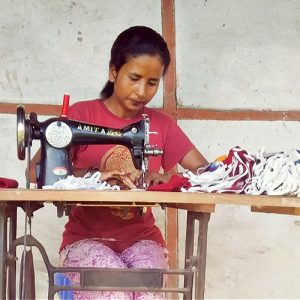 On April 11, AP transferred $250 to Sarita Thapa, leader of the Bardiya cooperative of family members of the disappeared (photo), an AP partner since 2015. Since April, Sarita has made 200 masks for a local clinic. Masks are now so easily available that the cooperative has decided to focus on making Tiger bags. AP recently raised $1,440 for the bag initiative on GlobalGiving which will produce 75 bags this year and pay bag-makers $34 a month. Beneficiaries: 200 clinic clients and one family of 5. Managed by the Network of Families of the Disappeared Nepal (NEFAD). On April 11, AP transferred $250 to Sarita Thapa, leader of the Bardiya cooperative of family members of the disappeared (photo), an AP partner since 2015. Since April, Sarita has made 200 masks for a local clinic. Masks are now so easily available that the cooperative has decided to focus on making Tiger bags. AP recently raised $1,440 for the bag initiative on GlobalGiving which will produce 75 bags this year and pay bag-makers $34 a month. Beneficiaries: 200 clinic clients and one family of 5. Managed by the Network of Families of the Disappeared Nepal (NEFAD).
|
Face masks and soap in Zimbabwe
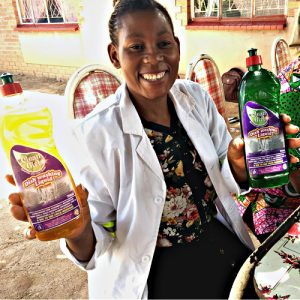 On April 8, AP transferred $500 Women Advocacy Project (WAP) in Zimbabwe, an AP partner since 2018. WAP’s founder Constance Mugari (photo) reached out to other friends and raised $4,500 which she has used to produce soap and face-masks. Working from home, the WAP team has produced 1,602 bottles of soap and 1,950 re-usable face masks. These have been included in kits, together with maize meal and cooking oil, and distributed to six clinics that serve over 11,000 Zimbabweans. WAP has also distributed emergency kits to over 100 vulnerable families in the communities of Epworth and Chitungwiza (top photo). Beneficiaries: 1,950 recipients of soap, masks + 100 families + 20 WAP girls (600 family members). Managed by Women Advocacy Project. On April 8, AP transferred $500 Women Advocacy Project (WAP) in Zimbabwe, an AP partner since 2018. WAP’s founder Constance Mugari (photo) reached out to other friends and raised $4,500 which she has used to produce soap and face-masks. Working from home, the WAP team has produced 1,602 bottles of soap and 1,950 re-usable face masks. These have been included in kits, together with maize meal and cooking oil, and distributed to six clinics that serve over 11,000 Zimbabweans. WAP has also distributed emergency kits to over 100 vulnerable families in the communities of Epworth and Chitungwiza (top photo). Beneficiaries: 1,950 recipients of soap, masks + 100 families + 20 WAP girls (600 family members). Managed by Women Advocacy Project.
|
Financial and nutritional support in Kenya
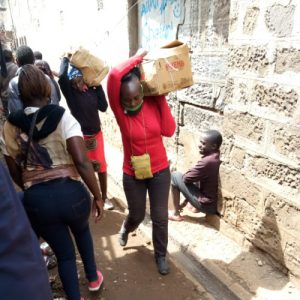 In April, AP transferred $700 to three local Kenyan women leaders in Nairobi, Caren, Stella and Christine, who had led the successful Woman’s World Quilt project at the ICPD25 conference in November 2019. Stella is a senior manager at the Tandaza Trust in the informal settlement of Kibera. The Trust used its donations, including that from AP, to reach 224 needy families, supply 9 families with food for a month, and provide sewing kits for nine women who had participated in the Women’s World Quilt project. Caren’s group used their funding to make and sell cushions in the Kangemi settlement. As restrictions begin to loosen in Nairobi, the women asked AP to support a new quilt project. Training would be provided by Christine, an expert seamstress who trained the Woman’s World Quilt team at ICPD25. Beneficiaries: 242 families (2,375 family members). Managed by the Tandaza Trust. In April, AP transferred $700 to three local Kenyan women leaders in Nairobi, Caren, Stella and Christine, who had led the successful Woman’s World Quilt project at the ICPD25 conference in November 2019. Stella is a senior manager at the Tandaza Trust in the informal settlement of Kibera. The Trust used its donations, including that from AP, to reach 224 needy families, supply 9 families with food for a month, and provide sewing kits for nine women who had participated in the Women’s World Quilt project. Caren’s group used their funding to make and sell cushions in the Kangemi settlement. As restrictions begin to loosen in Nairobi, the women asked AP to support a new quilt project. Training would be provided by Christine, an expert seamstress who trained the Woman’s World Quilt team at ICPD25. Beneficiaries: 242 families (2,375 family members). Managed by the Tandaza Trust.
|
Face masks in Palestine
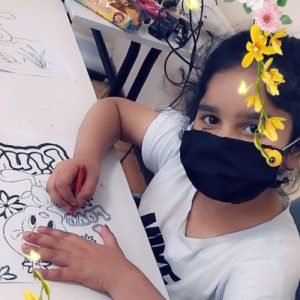 AP has transferred $250 to the Palestinian House of Friendship (PHF) to encourage the production of face masks. PHF’s mission is to provide a creative and social outlet for young people in the town of Nablus. This is particularly difficult at a time when Palestinians are facing COVID-19 and the Israel threat of annexation. Together with other donations the AP transfer enabled PHF to produce 400 masks for children in the village of Asira and Nablus, and train seven girl scouts in stitching. Beneficiaries: 400 + 7 Scouts (35 family members). Managed by Palestinian House of Friendship. AP has transferred $250 to the Palestinian House of Friendship (PHF) to encourage the production of face masks. PHF’s mission is to provide a creative and social outlet for young people in the town of Nablus. This is particularly difficult at a time when Palestinians are facing COVID-19 and the Israel threat of annexation. Together with other donations the AP transfer enabled PHF to produce 400 masks for children in the village of Asira and Nablus, and train seven girl scouts in stitching. Beneficiaries: 400 + 7 Scouts (35 family members). Managed by Palestinian House of Friendship.
|









